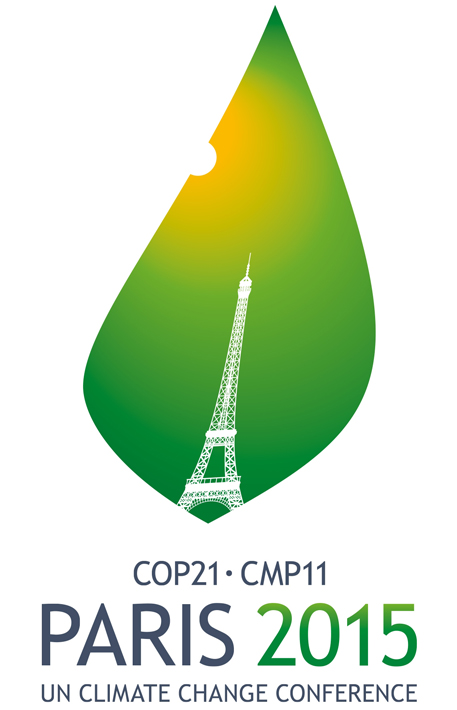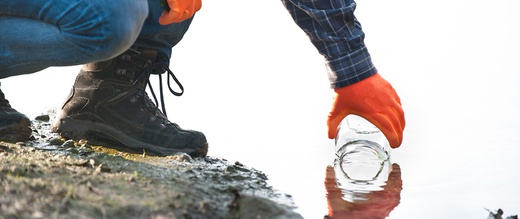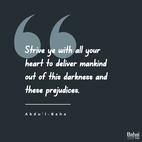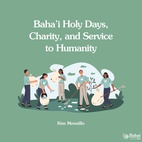The views expressed in our content reflect individual perspectives and do not represent the official views of the Baha'i Faith.
Paris is the universal centre of culture and learning, of science and the arts. She must also be the centre of spirituality. There are all sorts of fruits; some can only ripen in a cold climate; others need the warmth and others yet the tropical sun. So it is with Paris. The greatest efforts are necessary that she may blossom and bear fruit. – Abdu’l-Baha, Star of the West, Volume 2, p. 15.
Later this month representatives from most of the world’s nations will gather in Paris for COP21, the world’s latest global conference on climate change.
The success or failure of the Paris negotiations will have a huge impact on the world’s future, and on the kind of planet we leave for our children and grandchildren. For that reason, many experts maintain that no more important international conference has ever taken place.
 When the world’s leaders assemble in the City of Lights, they will have already committed their countries to significant reductions in greenhouse gas emissions (GHG). They agreed to do so six years ago, at the Copenhagen COP15 conference in 2009, where 195 nations pledged to work to reduce their GHG by 2025-2030. Their goal? The countries and their scientific communities aim to limit the world’s rise in average temperature to 2ᵒ Celsius (3.6ᵒ Fahrenheit) by the year 2100.
When the world’s leaders assemble in the City of Lights, they will have already committed their countries to significant reductions in greenhouse gas emissions (GHG). They agreed to do so six years ago, at the Copenhagen COP15 conference in 2009, where 195 nations pledged to work to reduce their GHG by 2025-2030. Their goal? The countries and their scientific communities aim to limit the world’s rise in average temperature to 2ᵒ Celsius (3.6ᵒ Fahrenheit) by the year 2100.
Why 2ᵒ? The Intergovernmental Panel on Climate Change (IPCC), the world’s leading scientific authority on the subject, has concluded that a global temperature increase of more than 2ᵒ Celsius would produce extreme and dangerous consequences for our planet. If we exceed 2ᵒ, their scientists deduced, sea levels would rise rapidly, flooding entire cities; widespread crop failures would exacerbate world hunger; coral reefs and ocean fisheries would collapse; extreme drought and devastating storms would proliferate; we would witness substantial species extinction. The world has agreed that we must do our best to avoid those dire and unsustainable consequences. In Paris, governments will implement that agreement by voluntarily taking steps to limit their GHG emissions in an attempt to meet the 2ᵒ target.
Even though it’s not perfect, this kind of international unity of purpose has never happened before.
Think about it: much of the world’s economic growth comes from fossil fuel energy. We burn oil, coal and gas to power our cars, our homes, our factories and our cities. With that burning, we add ton after ton of carbon to the atmosphere we breathe, and it traps more heat as a result. The world’s leaders will agree, in Paris, to limit the burning of fossil fuels, despite the impact on their economies. This is new.
However—we do not have complete, worldwide agreement on these issues yet. About 150 countries, including those responsible for 90% of the world’s GHG pollution, have submitted their plans to reduce emissions. But those plans only represent goals, and rely on no binding authority to enforce them. So—will they suffice? Do the Paris plans have what it takes to protect the planet and its future? The answer: the climate scientists at the United Nations now estimate, if all those countries meet their emissions targets by the year 2030, that the Earth’s temperature will rise 2.7ᵒ Celsius by the end of this century.
Obviously we’re not there yet—a 2.7ᵒ average rise in global temperatures still means many catastrophic future consequences—but we’re making some gradual, slow progress. Without the agreed-upon emissions cuts nations will commit to at COP21 in Paris, our planet’s temperature trajectory would have risen much higher, from between 4.5ᵒ Celsius to 7ᵒ by 2100. How serious would that be? Well, to put it in perspective, the entire Earth only got about 4-7ᵒ cooler during the last Ice Age, when North American and European glaciers covered most of those land masses in hundreds of feet of ice.
Or, from another perspective, think of your body. With a 2ᵒ rise in body temperature, you’re really sick—but a 4ᵒ temperature rise means you die. Four degrees isn’t just a linear, twice-as-high fever as two degrees—it means a catastrophic consequence all our climate models cannot possibly predict.
So, here’s the conclusion: despite all the world’s efforts so far, we still face enormous and seemingly intractable problems. Read more about COP21.
This raises a huge question for us all: what can I personally do about the world’s future? I heard a climate scientist’s answer to that question the other day. She said: “On a personal level, you can stop eating meat. That will accomplish even more than driving a hybrid car or installing solar panels on your home.” Sure, that may help in a small way, but I’d like to suggest a different answer to this vitally important question, one that I haven’t heard many people put forth: you can join together with others in a worldwide effort to unify and protect the planet:
Our world has entered the dark heart of an age of fundamental change beyond anything in all of its tumultuous history. Its peoples, of whatever race, nation, or religion, are being challenged to subordinate all lesser loyalties and limiting identities to their oneness as citizens of a single planetary homeland. In Baha’u’llah’s words: “The well-being of mankind, its peace and security, are unattainable unless and until its unity is firmly established.” – The Universal House of Justice, in its foreword to Baha’u’llah’s Most Holy Book, p. 11.
No other solution has anywhere near the total global impact of this kind of individual action. It unites your personal efforts with other like-minded people; it exponentially multiplies and extends the scope of your commitment from one person to millions; it creates the impetus for a permanent, lasting foundation of a real, binding and universal world parliament that can and will stop the pollution and destruction of our precious planet. Please follow along in this short series of essays as we examine this revolutionary approach to solving the world’s climate crisis.

















Comments
Sign in or create an account
Continue with Facebookor